Feeling overwhelmed, anxious, or down? Seeking a source of comfort and companionship? Look no further than your local animal shelter because the answer may be purring right in front of you – cats.
These furry feline creatures have been known to provide numerous benefits for individuals struggling with mental health issues. And as someone who has personally experienced the positive effects of owning a cat while battling depression and anxiety, I can confidently say that they are more than just cute and cuddly pets.
In this blog post, we’ll dive into the world of cats and their impact on our mental well-being. From their calming presence to their unconditional love, there’s no denying that these whiskered wonders make excellent companions for those going through tough times. So grab your favorite mug (or catnip tea if you’re feeling adventurous) and let’s explore how cats can help with depression and anxiety.
Are Cats Good For Depression And Anxiety?
Contents
It’s no secret that cats make great pets – with their soft fur, playful antics, and loving purrs, they bring joy and companionship into our lives. But did you know that they can also have a positive impact on our mental well-being?
Studies have shown that owning a cat can have significant benefits for those struggling with depression and anxiety. In this blog post, we’ll dive into the question “Are Cats Good For Depression And Anxiety?” and explore the ways in which our feline friends can help improve our mental health.
The Power of Oxytocin
Interacting with cats can release oxytocin in humans, a hormone known as the “love hormone.” This hormone promotes feelings of trust and well-being, helping to reduce feelings of loneliness and isolation, which are common symptoms of depression.
Reducing Stress Levels
The calming presence of a cat can also help reduce stress and anxiety levels. Petting a cat has been found to lower cortisol, a stress hormone, in both the cat and the person. This can have a calming effect on the body, helping to lower blood pressure and heart rate.
Providing a Sense of Purpose
Caring for a cat can provide a sense of purpose and responsibility, which can be particularly helpful for individuals struggling with symptoms of depression. Feeding, grooming, and playing with a cat can give a sense of routine and structure to one’s day.

Joy and Laughter
The playful nature of cats can bring joy and laughter into our lives. Their silly antics and curious personalities can provide a much-needed distraction from negative thoughts and feelings. Plus, who can resist smiling when watching a cat chase after a laser pointer?
Improved Physical Health
Owning a cat has also been linked to improved physical health. Studies have shown that cat owners have lower blood pressure and a reduced risk of heart disease, both of which are common comorbidities with depression and anxiety.
But while cats can bring many benefits to our mental health, it’s important to note that they should not be seen as a substitute for therapy or medication. It’s essential to seek professional help when dealing with depression and anxiety.
Serotonin and Oxytocin: The “Feel-Good” Hormones Released by Cats
Cats are not only cute and cuddly, but they also have the power to release two of our body’s “feel-good” hormones: serotonin and oxytocin.
Serotonin is a neurotransmitter that plays a crucial role in regulating mood, sleep, and appetite. Low levels of serotonin have been linked to depression and anxiety. On the other hand, oxytocin is a hormone that promotes feelings of trust, relaxation, and happiness during social bonding. So, how exactly do cats help increase these hormones?
Research has found that simply interacting with cats can lead to an increase in serotonin and oxytocin levels in humans. A study at the University of Missouri-Columbia found that petting a cat for just 10 minutes can significantly increase serotonin levels in the brain. Similarly, a study by UCLA found that interacting with cats can also increase oxytocin levels.
The release of these “feel-good” hormones can have a positive impact on individuals struggling with depression and anxiety. In fact, some anti-depressant medications work by increasing levels of serotonin in the brain. So, it’s no surprise that having a cat as a companion can improve overall mood and reduce stress levels.
The calming effect of petting a cat can also lower blood pressure and heart rate, making it an excellent form of relaxation for those dealing with anxiety. And let’s not forget about the rhythmic sound of a cat’s purring, which has been found to have a soothing effect on humans.
But it’s not just physical interactions with cats that can boost our mood. The mere presence of a cat can provide companionship and alleviate feelings of loneliness, which are common symptoms of depression and anxiety. Caring for a pet also requires responsibility and routine, providing structure in daily life for individuals struggling with mental health disorders.
While cats can bring many benefits, it’s important to remember that they are not a substitute for professional help when dealing with mental health issues. However, their presence and ability to release serotonin and oxytocin make them valuable companions in promoting overall well-being.
The Calming Effect of Petting a Cat on Anxiety
If you’re a cat owner, you probably already know the calming effect that petting your furry friend can have on your anxiety levels. But did you know that there is actual scientific research to back this up?
A study published in the Journal of Affective Disorders found that just 15 minutes of petting a cat can lead to a decrease in feelings of anxiety and an increase in positive emotions. This is because petting a cat triggers the release of oxytocin, also known as the “love hormone,” which promotes relaxation.
But it’s not just about the chemical reactions in our bodies – there are also physical benefits to petting a cat. The repetitive motion of stroking their soft fur can have a meditative quality, helping to quiet racing thoughts and promote mindfulness. This can be especially helpful for individuals with anxiety who struggle with racing thoughts and feelings of overwhelm.
Additionally, interacting with cats has been found to lower blood pressure and heart rate, both of which are often elevated in individuals with anxiety. So not only do they make us feel calm and relaxed, but they also have positive effects on our physical well-being.
And let’s not forget about the emotional support that cats provide. Their unconditional love and companionship can greatly improve the overall well-being of their owners and help manage symptoms of anxiety. In fact, cats have been used as therapy animals for individuals with mental health conditions such as anxiety and depression.
Routine and Responsibility: How Caring for a Cat Can Help with Depression
Consider caring for a cat. Not only are cats adorable and lovable creatures, but research has shown that they can also have a positive impact on mental health, particularly in managing depression. In this section, we will explore the benefits of caring for a cat in promoting routine and responsibility, mindfulness, companionship, and comfort during difficult times.
Establishing a routine and a sense of responsibility is crucial for individuals dealing with depression. Cats require daily care, such as feeding, grooming, and playtime, which can provide structure and purpose in one’s daily life. This can be especially helpful for those who struggle with finding motivation or a sense of direction. By caring for a cat, individuals can establish a routine and feel a sense of responsibility, which can have a positive impact on their overall well-being.
Caring for a cat also promotes mindfulness. Cats are known for their independent nature, but they also crave attention and affection from their owners. By focusing on their cat’s needs and providing them with love and care, individuals can shift their focus away from their own negative thoughts and worries. This act of being present in the moment can bring a sense of peace and calmness, reducing symptoms of depression.
Furthermore, the physical aspect of caring for a cat can have beneficial effects on mental health. Petting a cat has been shown to lower blood pressure and reduce stress levels. This physical connection with a furry friend can release feel-good hormones like oxytocin, dopamine, and serotonin, promoting relaxation and improving mood.
Cats also make great companions for individuals struggling with loneliness or isolation due to depression. They offer unconditional love and support without judgment, providing much-needed comfort during difficult times. In fact, studies have shown that petting a cat can increase levels of oxytocin in both the human and feline, creating a bond between owner and pet.
Cats are also highly intuitive animals and can sense when their owners are feeling down or anxious. They will often try to offer comfort by snuggling up next to them or purring, providing a source of emotional support. This can be incredibly soothing and calming for individuals dealing with depression and anxiety.
Encouraging Physical Activity Through Playtime with Cats
Cats are not just cute and cuddly companions, but they can also be powerful allies in managing depression and anxiety. As natural hunters, cats have a strong instinct to play and hunt, making them great playmates for individuals struggling with these conditions. In this section, we will explore the various benefits of playing with your cat for physical and mental health and provide tips on different types of play that cater to individual preferences and abilities.
Physical Benefits:
Playing with your cat encourages physical activity, which is essential for maintaining good physical health. Regular playtime can help individuals with depression combat low energy levels and sluggishness. It also promotes better sleep patterns, which can improve overall mood. Moreover, playing with your cat releases endorphins – chemicals in the brain that promote feelings of happiness and well-being. These endorphins can help counteract the effects of low mood and boost overall mood.
Mental Benefits:
Playing with cats has numerous mental health benefits. It provides a sense of purpose and responsibility, which can be especially helpful for individuals struggling with depression and anxiety. Taking care of a pet gives individuals something to focus on and care for, which can improve their overall outlook on life. Additionally, playing with cats can help reduce stress and anxiety levels. The act of playing and interacting with a cat can be calming and distracting, allowing individuals to temporarily escape their worries and focus on the present moment.
Types of Play:
The type of playtime with cats may vary depending on the individual’s preferences and abilities. Some may prefer more active play, such as using toys or laser pointers, while others may prefer quieter forms of play, like grooming or simply petting their cat. It is essential to find what works best for you and your cat.
Incorporating Interactive Toys:
Incorporating interactive toys into playtime can provide mental stimulation for cats and keep them physically active. This can be particularly helpful for individuals who may not have the energy or ability to engage in more active play. Interactive toys, such as puzzle feeders and wand toys, can keep your cat entertained and mentally stimulated for hours.
The Therapeutic Bond Between Cats and Their Owners
Cats are more than just cute and cuddly companions – they can also be powerful allies in the battle against depression and anxiety. As an expert on the therapeutic bond between cats and their owners, I have seen firsthand the positive impact that these furry creatures can have on mental health. In this section, we will explore the various ways that interacting with cats can benefit our well-being.
Stress relief and increased happiness
It’s no secret that playing with cats can be incredibly relaxing and enjoyable. But did you know that it can also have a tangible impact on our stress levels and happiness? Research has shown that interacting with cats can reduce stress and increase feelings of relaxation and happiness. This is due in part to the calming presence of cats and their ability to provide comfort and support to their owners.
The “love hormone”
Have you ever noticed how content you feel when petting a cat? This is because the physical interaction with these furry friends releases oxytocin, also known as the “love hormone.” Oxytocin is responsible for promoting feelings of trust, bonding, and relaxation. So next time you’re feeling stressed or anxious, try spending some quality time with your feline companion.
Companionship and purpose
For those struggling with loneliness or isolation, owning a cat can provide much-needed companionship. Cats offer unconditional love, comfort, and entertainment, which can be incredibly beneficial for individuals with depression or anxiety. Additionally, caring for a cat can bring a sense of purpose and routine to our lives, which can be helpful in managing symptoms of mental illness.
Entertainment and distraction
Let’s face it – cats are hilarious creatures. Their playful antics and curious nature can bring joy and laughter into our lives, helping to alleviate symptoms of depression and anxiety. Furthermore, caring for a cat requires some level of physical activity, such as playing with them or cleaning their litter box. This physical activity can release endorphins and improve overall mood.
Animal-assisted therapy
Many therapists incorporate animal-assisted therapy into their treatment plans for clients with mental health issues. Cats are often used in this type of therapy due to their calming presence and intuitive nature. Through interactions with cats, individuals may learn to better regulate their emotions and develop coping strategies for managing symptoms of depression and anxiety.
Important Considerations for Individuals Seeking Mental Health Support with Cats
Important Considerations for Individuals Seeking Mental Health Support with Cats
Cats have been known to provide emotional support and companionship for individuals dealing with mental health issues such as depression and anxiety. Interacting with cats has been found to have numerous therapeutic benefits, including stress relief, increased happiness, and the release of oxytocin. However, before considering a cat as a form of mental health support, it is crucial to consult with a mental health professional.
Discuss Potential Benefits and Limitations
While cats can provide companionship and comfort, they may not be a suitable form of treatment for everyone. It is essential to have an open and honest conversation with a mental health professional about the potential benefits and limitations of having a cat as a source of support. They can help determine if a cat would be beneficial for your specific mental health needs.
Consider Allergies, Fears, and Financial Responsibilities
Before bringing a cat into your home as a form of mental health support, it is crucial to consider any allergies or fears you may have. If you are allergic to cats or have a fear of them, having one may do more harm than good. Additionally, owning a cat comes with financial responsibilities such as food, litter, and veterinary costs. These factors should be carefully considered before making a decision.
Not a Replacement for Professional Treatment
While cats can bring joy and comfort to individuals dealing with depression and anxiety, they should not be seen as a replacement for professional treatment and therapy. It is essential to continue seeking proper mental health support while also enjoying the companionship of a cat.
Conclusion
In conclusion, the answer to the question “Are cats good for depression and anxiety?” is a resounding yes. As we have explored in this blog post, these furry feline creatures offer numerous benefits for individuals struggling with mental health issues. Not only do they provide companionship and routine, but their presence also triggers the release of feel-good hormones like oxytocin and serotonin.
But let’s not forget that while cats can offer support and comfort, they should never be seen as a replacement for professional treatment. Seeking help from a mental health professional is crucial when dealing with depression and anxiety.
So if you’re feeling overwhelmed or down, why not consider visiting your local animal shelter and adopting a cat? Not only will you be giving a loving home to an animal in need, but you may also find a source of comfort and companionship right in front of you – purring and all.






